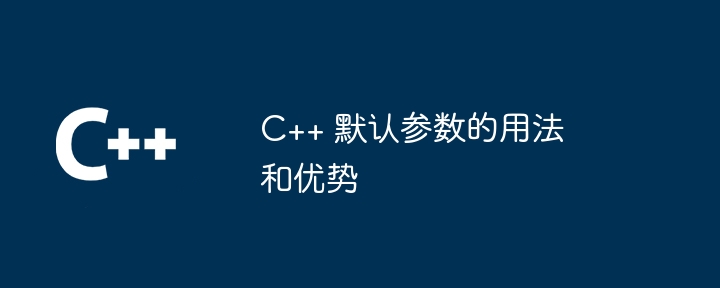
Yes, the default parameter feature in C allows you to omit certain parameters when a function is called. When the function is called and these parameters are not provided, the default values are used, thereby improving the flexibility, readability and Maintainability.

C Default parameters: powerful functions and convenience
Overview
Default Parameters allow you to omit certain parameters when calling a function. When the function is called, if these parameters are not provided, the default values are used. Default parameters provide code flexibility, readability, and maintainability.
Usage
To specify default parameters, simply specify them in the function's parameter list and provide a default value:
void myFunction(int a, int b = 5, int c = 10) { // 函数体 }
In this example , the default values ofbandcare 5 and 10 respectively.
Call
You can call a function with default parameters just like a normal function. When you omit a default parameter, its default value is used:
myFunction(1); // b 和 c 将使用其默认值 myFunction(1, 7); // b 为 7,c 将使用其默认值 myFunction(1, 7, 12); // b 和 c 分别为 7 和 12
Advantages
Using default parameters has the following advantages:
Practical case
The following is a function that prints a string with a default length:
void printString(string str, int length = 20) { cout << str.substr(0, length) << endl; }
This function can also be like Called like this, only provide string parameters:
printString("Hello World"); // 输出:Hello World
Or specify the length here:
printString("Hello World", 10); // 输出:Hello Wo
Conclusion
The default parameter is a useful one in C feature that allows you to omit certain parameters when calling functions, thereby improving the flexibility, readability, and maintainability of your code.
The above is the detailed content of Usage and advantages of C++ default parameters. For more information, please follow other related articles on the PHP Chinese website!
 What are the differences between c++ and c language
What are the differences between c++ and c language Recommended learning order for c++ and python
Recommended learning order for c++ and python Cost-effectiveness analysis of learning python and c++
Cost-effectiveness analysis of learning python and c++ Is c language the same as c++?
Is c language the same as c++? Which is better to learn first, c language or c++?
Which is better to learn first, c language or c++? The difference and connection between c language and c++
The difference and connection between c language and c++ C++ software Chinese change tutorial
C++ software Chinese change tutorial Cost-effectiveness analysis of learning python, java and c++
Cost-effectiveness analysis of learning python, java and c++



